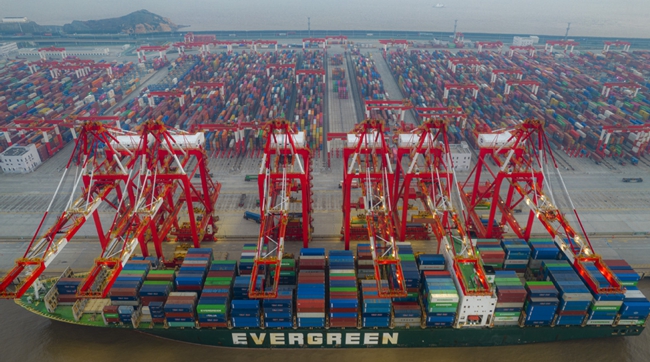Shanghai FTZ unveils tax policies for temporary import repairs

Containers get loaded on an automated wharf at a port in Shanghai. [Photo/IC]
Five governing bodies, including the Ministry of Finance, Ministry of Ecology and Environment, Ministry of Commerce, General Administration of Customs, and State Taxation Administration, have jointly issued a notice on tax policies for temporary import repairs in the China (Shanghai) Pilot Free Trade Zone (FTZ).
The notice came into effective on June 27, 2024, and it underlines Shanghai's commitment to enhancing its position as a global trade hub, setting a precedent for high-level institutional opening-up and reinforcing its role as a leader in trade facilitation.
The notice states that goods temporarily imported into the Shanghai FTZ for repair will be eligible for bonded treatment and exempt from customs duties, import value-added tax (VAT), and consumption tax upon re-export. Goods not re-exported and instead sold domestically will be subject to standard import duties and taxes.
This policy, applicable in the Shanghai FTZ including the Lin-gang Special Area, aims to deepen reform and innovation in the region, enhancing Shanghai's role as a benchmark for high-level opening-up. It will also provide valuable experience for improving the management of imported repair goods and facilitating trade.
The notice specifies that the policy applies to special customs supervision areas within the Shanghai FTZ, such as the Yangshan Special Comprehensive Bonded Zone, the Shanghai Pudong Airport Comprehensive Bonded Zone, the Shanghai Waigaoqiao Port Comprehensive Bonded Zone, and other approved areas. Goods eligible for repair include items listed in the maintenance product catalog formulated by relevant authorities.
Enterprises conducting repair activities under this policy must be approved by the management committees of the special customs supervision areas in coordination with commerce, environmental, and customs authorities. Approved enterprises must maintain an information management system to track the entire repair process, including the handling of replaced parts and waste.
The Shanghai municipal government, in collaboration with national departments, will develop supporting regulatory measures to manage import repair goods, establish standards for dealing with violations, and define penalties. These measures will be implemented concurrently with the notice, emphasizing the importance of information technology for supervision and the need for information sharing among relevant departments.
Source: Ministry of Finance, Shanghai Municipal Finance Bureau


 China's public holidays for 2025
China's public holidays for 2025  Shanghai FTZ: Go all out to build China's first pilot zone for Silk Road E-commerce cooperation
Shanghai FTZ: Go all out to build China's first pilot zone for Silk Road E-commerce cooperation  Favorable policies boost 'China Travel' trend
Favorable policies boost 'China Travel' trend  play
play 